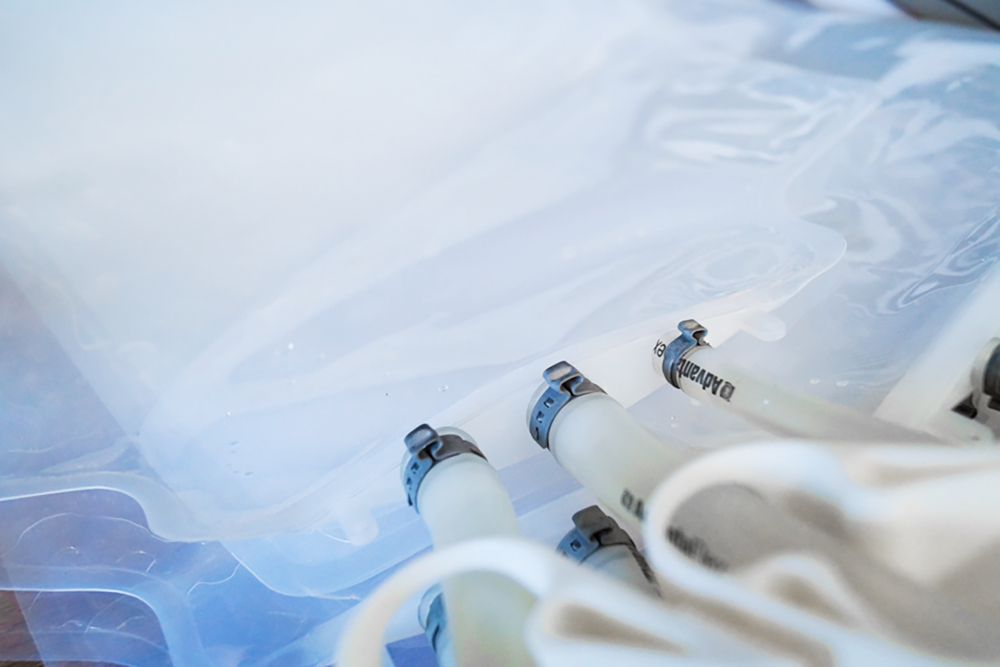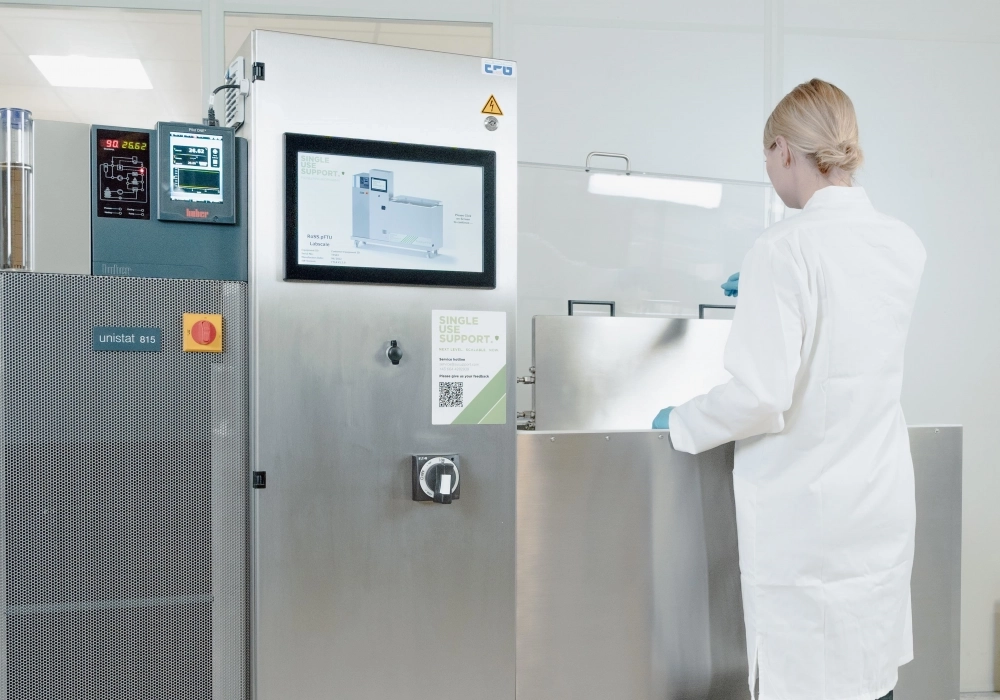Optimizing pDNA production using advanced single-use technologies
Table of contents
ShowThe field of plasmid DNA (pDNA) is witnessing remarkable innovations and advances. As the demand for therapeutic DNA continues to surge, so does the need for efficient, scalable, and safe manufacturing processes. In response to this demand, the integration of single-use technologies (SUTs) has emerged as a transformative force, developing further stages of pDNA production.
In this comprehensive guide, we delve into the exciting field of pDNA manufacturing, with a focus on the groundbreaking impact of single-use technologies. From improving the filling process to optimized freezing, storage, and shipping of the final product – the integration of single-use technologies has paved the way for streamlined operations, reduced contamination risks, and increased overall efficiency.
Improving pDNA manufacturing steps
The process of transforming raw materials into the final therapeutic product in biopharmaceutical production is a complex undertaking for pDNA manufacturing companies. Several key manufacturing steps are essential in guaranteeing the quality, purity, and potency of plasmid DNA. However, the current methods of pDNA manufacturing often present challenges such as contamination risks, time-consuming processes, and limitations in scalability. Furthermore, manufacturing requirements can change quickly, which requires a high level of process versatility.
The incorporation of single-use technologies is a groundbreaking approach that is reshaping pDNA manufacturing. The inclusion of SUTs at different stages of manufacturing has initiated an era of enhanced efficiency, accuracy, and adaptability.
In the following chapters, we will explore the developments that are transforming pDNA production, streamlining the entire process to enhance efficiency, cut costs, and improve quality – one stage at a time.
Homogenization of pDNA
Homogenization is a critical step in the plasmid DNA (pDNA) manufacturing process, aimed at ensuring uniformity and consistent dispensing of plasmid DNA into single-use bioprocess containers. With the integration of advanced single-use technologies, this step is experiencing a transformative enhancement.
Homogenization traditionally involves mechanical processes that require significant manual intervention. The process can therefore be time-consuming and, above all, result in aliquot-to-aliquot deviations. Automated platforms based on single-use technologies gently agitate and mix pDNA to ensure consistent distribution. In fact, automated solutions facilitate process standardization and thereby reduces the risk of inconsistencies within the solution.
Filling & Filtration of pDNA with single-use technologies
The implementation of single-use technologies has substantially enhanced the filling process of plasmid DNA into storage containers. SUTs utilize customized single-use bags that are designed to maintain sterility and prevent contamination risks, which obviates the necessity for extensive cleaning. The employment of automation further boosts the accuracy and productivity of pDNA filling.
Automated fluid management systems utilizing single-use technologies are controlled platforms for the standardized filling & filtration of pDNA. This leads to increased accuracy while reducing potential for human errors. The systems are capable of accommodating varying batch sizes without compromising quality, making them scalable. Moreover, sterile bags and automated systems contribute to product integrity, meeting regulatory as well as cGMP standards while ensuring patient safety.

Accurate dosing of pDNA is essential for maintaining product quality and meeting regulatory requirements. SUTs streamline the aliquotation process, providing automated systems that precisely divide large pDNA solutions into smaller, uniform aliquots. This automation not only enhances accuracy but also minimizes the risk of contamination during aliquotation, contributing to overall process efficiency.
The integration of dedicated fluid management solutions by Single Use Support brings several advantages: Automation reduces manual labor, minimizing the potential for human error and ensures reproducibility. Additionally, the pre-sterilized components reduce cross-contamination risks, enhancing the integrity of the pDNA product. The scalable nature of Single Use Support’s fluid management platform enables manufacturers to adapt to varying production scales without compromising quality.
Freezing plasmid DNA with SUT
Freezing plasmid DNA is crucial for its long-term stability and functionality. However, the conventional freezing process can introduce challenges such as cryoconcentration and temperature inconsistencies that might compromise pDNA integrity.
Traditionally, pDNA freezing involves placing samples in vials or other containers and subjecting them to cryogenic freezing with little control over the freezing process. This can lead to inhomogeneous freezing rates, resulting in the formation of damaging ice crystals that may disrupt the DNA structure. Additionally, temperature fluctuations and an extended phase transition during storage can further impact pDNA stability, requiring additional stability testing and posing risks to product integrity.
However, with innovative plate-based freezers that allow full control over the freezing rates, the process can be tailored to the exact need of plasmid DNA. Covered in single-use bag protection, the single-use bags containing pDNA can be frozen at low freezing rates (usually down to -80 °C), allowing for more even freezing results and better overall product quality.

Plasmid DNA storage and shipping – enhancements with single-use technologies
Storing and shipping plasmid DNA (pDNA) requires dedicated process solutions, making sure that cold chain integrity is granted.
One primary challenge lies in temperature variations, which can compromise pDNA quality. Traditional storage methods often struggle to uphold the low temperatures with best air temperature uniformity required for preservation. Single-use cold chain shipping containers can be deployed to maintain temperature consistency, preventing deviations that can harm pDNA samples.
Maximizing space efficiency in pDNA storage and shipping is a critical hurdle. Traditional walk-in freezers can be bulky and space-consuming, while lab freezers are too small for larger amounts of pDNA. The ultra-cold storage freezer RoSS.ULTF fills this gap, providing air temperature uniformity and stackability. The modular setup optimizes space utilization and frees up valuable laboratory area.
ULT freezers must not only be space-efficient themselves, but also have to provide high storage density. Therefore, Single Use Support offers compatible protection for every primary packaging, including single-use bags in all sizes – compact and stackable. Allowing for ULT freezers to be filled efficiently, they fit various storage needs and are scalable to accommodate different batch sizes and requirements.
Advanced pDNA production with Single Use Support
In the fast-paced realm of biopharmaceutical production, Single Use Support has established itself as a specialist in single-use technologies. These cutting-edge solutions are carefully crafted for plasmid DNA manufacture, optimizing the effectiveness and excellence of the entire pDNA production process.
By seamlessly integrating Single Use Support's products, pDNA production can be improved. Plasmid DNA can be filled into IRIS single-use bioprocess containers, which can be protected by RoSS.KSET. Fluid management can be streamlined with automated solutions for homogenous filling, reducing the need for manual intervention.
Single Use Support's expertise extends to cold chain logistics: With a plate-based freeze/thaw platform, fast and controlled freezing rates can be achieved that help maintain the quality of pDNA. Subsequently, the frozen substances are ready for storage in RoSS.ULTF – Single Use Support ULT freezer – or transport in RoSS.SHIP. This revolutionary cold chain shipping container is not only extremely space efficient, but – most importantly – guarantees temperature integrity during transit. It reduces temperature variations and maintains pDNA quality in difficult shipping conditions.
Aligned with the high demands in drug development and drug delivery, single-use technologies bring a variety of advantages in the production of plasmid DNA:
- Enhanced process efficiency: Streamlined processes and reduced manual interventions lead to increased operational efficiency.
- Maximized process safety: Closed single-use systems minimize the risk of contamination, ensuring product purity.
- Flexibility: Modular designs allow easy adaptation to varying production scales and product requirements.
- Cost savings: Elimination of complex cleaning and validation processes results in significant cost reduction.
- Reduced time-to-market: Faster setup and reduced validation cycles contribute to quicker product development and market entry.
- Seamless adaptability: Single Use Support's solutions seamlessly integrate storage, freezing, and shipping processes.
- Reduced environmental impact: Reduced water usage, energy consumption, and waste generation help make pDNA production more sustainable.









